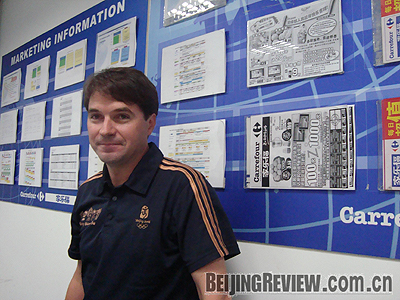|
Yu Yong, Director of the Chengdu Culture and Tourism Development Group, describes how life is going on and endeavors are being made to repair the city's damaged reputation. A recent Panda Festival in Hong Kong has helped to spread the word that the city is safe, a shopping festival is ongoing and the Snow Mountain Festival is still planned for the winter. Meanwhile, commercially 18 enterprises from around the country have pledged to hold major meetings in Chengdu in the course of the year and the Western Exhibition Festival, postponed until October, will also help to attract visitors and potential investment. Furthermore, the tourism bureau of the city has invited 200 heroes from rescue teams to return to Chengdu to receive the famous Sichuan hospitality.
Guan reports that since the earthquake several Taiwanese groups have visited the city. His organization targets tourists from Japan, Europe, and America, but recovery is still slow, despite the fact that the city has experienced virtually nothing in the way of aftershocks. It seems that the impact on the city is not so much one of physical ruin, but in the confidence of its potential visitors.
 |
| CORPORATE CITIZENSHIP: Arnaud Dupont of Carrefour describes the corporate responsibility of companies during emergencies (YUAN YUAN) |
For the people of Sichuan, there is no choice but to go on. Arnaud Dupont, Regional Manager of China West Region of supermarket chain Carrefour, described how there was no option but to carry on with business as usual, while doing the best they could as a corporation to alleviate the suffering of the victims.
Carrefour was hit hard. Its suppliers from the local area had their produce obliterated. About 400 of their local staff were directly affected by the disaster. Yet the store did its best to contribute to the appeal, lowering its prices, donating noodles, bread and water, and outlining a plan to donate part of its national profits to the recovery. Yet, as Dupont says, "we are also the consumer." Carrefour clearly considers itself a citizen of the locality. Its confidence is not rocked, and it intends to go ahead with the opening of five new stores in the Sichuan vicinity in the next few years.
The tourism bureau wishes to assuage peoples' fears and encourage visitors back to the area. Just as the panda breeding center has always dealt capably with the problems of the endangered bear's survival, with similar care and nurturing paid to the local economy, the people of Sichuan will prosper again. The hospitality of those Sichuan people is really as rich and generous as its legendary food. One heart-warming aspect of this tragedy is that a people who have lost so much are still prepared to give so much to attract people to their beautiful home city. |

